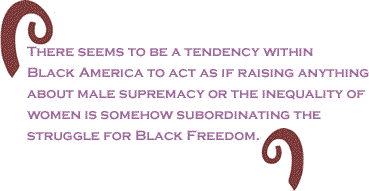|
International
Women’s Day (March 8th) introduces “Women’s
History Month”, IWD came into being in the early 20th
century as a result of the struggles of women workers in
New York. Women around the world commemorate that day as
a day of struggle and recognition of women’s on-going efforts
toward achieving freedom and dignity.
Yet
in Black America, for the most part with the exception of
the Black Left, little attention is paid to International
Women’s Day. This has always struck me as odd since Black
America is not just made up of men. I suppose that it should
not be odd in part because, as African Americans, we are
so focused on issues of race that we often subordinate or
ignore issues facing women, or issues of gender generally.
It
should also not surprise me because of the way that “women”
are often defined in this society. Take, for instance, our
recent presidential campaign. Whether in the Hillary Clinton
campaign or later with Sarah Palin, the term “women” came
to represent a description of white women. It was not an
all-inclusive term to describe women of different colors.
When it came to a candidate speaking to issues facing women,
the assumption was that it would be a white woman for the
most part speaking to the issues of white women.
In
reaction to that there seems to be a tendency within Black
America to act as if raising anything about male supremacy
or the inequality of women is somehow subordinating the
struggle for Black Freedom. In fact, I have gotten into
countless discussions with other Black folks where, when
the issue of the rights of women arises, someone will inevitably
say that such issues are only or mainly the concerns of
white women and that they are of little concern to Black
America.
While
views such as those cited are patently untrue, what is nevertheless
intriguing is that there is often a reluctance to discuss
this or debate this publicly. An example of this came up
at the time of the 1995 Million Man March. While there were
those who supported the views of Amiri Baraka [who said,
who goes to war and leaves half their army at home] and
Julianne Malveaux, who both were critical of the march for
being all-male and focusing rather exclusively on the Black
male rather than the partnership between Black men and women,
this was not an easy discussion, and in fact it was a discussion
that was suppressed at the time.

Black
America focuses a great deal of attention on the plight
of the Black male, but as a people we spend precious little
time on the issues facing Black women. We may mention, in
passing, the high HIV/AIDS rate among Black women, but when
we speak of HIV/AIDS, we tend to think about Black men.
We correctly focus on the loss of manufacturing jobs - a
fact that is destroying Black America’s living standard
- many of which are held by Black men, but we tend to spend
little time on under-employment among Black women, not to
mention unequal salaries and job opportunities. There is
little attention focused on matters of daycare, though we
will regularly hear challenges to Black men to be better
fathers. And we seem to be embarrassed to have public discussions
regarding sex and sexuality, not to mention discussions
regarding rape and partner abuse.
I
am hoping for a rethinking of International Women’s Day
within Black America. While we certainly need renewed attention
to Black women historical figures, we especially need attention
paid to the centrality of women in Black America and the
challenges that they face (challenges often brought about
by Black men, I might add).
It
may be too late to do this for IWD 2012, but then again,
March 2012 is not over yet.

BlackCommentator.com Editorial Board member, Bill Fletcher, Jr., is a Senior Scholar with
the Institute for
Policy Studies, the immediate past president of TransAfricaForum and co-author of Solidarity Divided: The Crisis in Organized Labor and a New Path
toward Social Justice (University of California Press), which examines
the crisis of organized labor in the USA. Click here to contact Mr. Fletcher.
|

